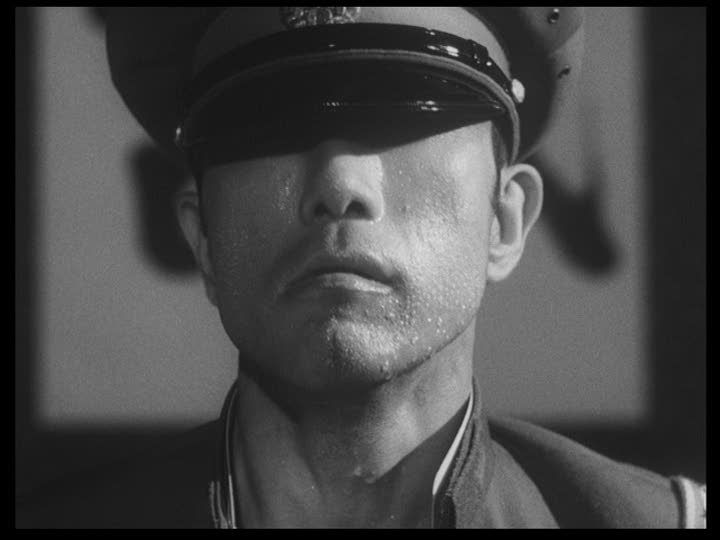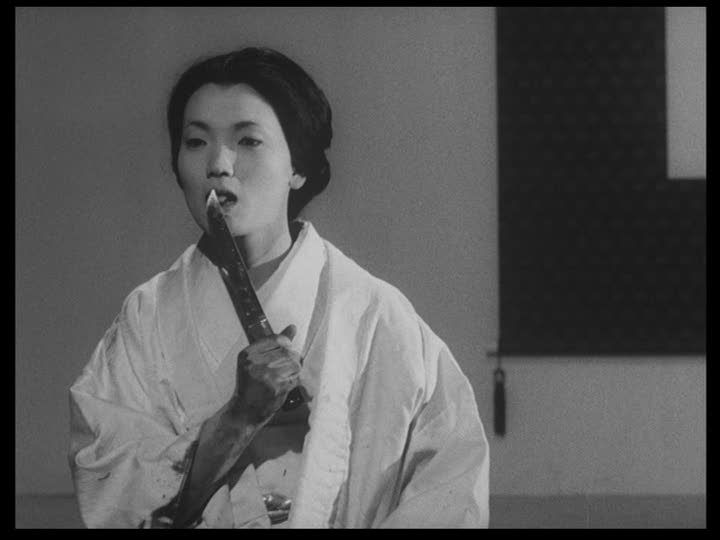
[This review is posted in preparation for the latest discussion for The Oldest Established Really Important Film Club, which will be discussing Paul Schrader's Mishima: A Life in Four Chapters this month. Stop by Krauthammer's blog Crips and Mutes on November 23 to join the discussion.]
Patriotism, the sole film made by famed Japanese author Yukio Mishima, is a weird artifact, a thirty-minute short film with no dialogue. It's obviously a deeply felt film, a sensual and serious presentation of the ritual suicide of a soldier and his wife, with each detail lovingly examined. On the other hand, it's also an incredibly preposterous film, plodding relentlessly through a preset sequence of events, towards an unavoidable conclusion. The film's story is set up entirely in text with a scroll that appears before the film proper begins; the short was adapted from one of Mishima's own short stories, and it shows in this overly literary grounding. Mishima himself plays a soldier named Takeyama, who is in a tough position: having remained loyal to the Emperor during a failed coup attempted by his friends, he is now scheduled to preside over the execution of the rebels. However, he is unable to face killing his friends, and instead plans to kill himself by harakiri. His wife, Reiko (Yoshiko Tsuruoka) vows to join him in the act, so that they might die and enter the afterlife together.
It's virtually impossible to watch this film without thinking about what it reflects about the film's director/writer/star. Only four years after this film was made, Mishima himself committed harakiri, so the film's meticulous, step-by-step depiction of the ritual suicide and the preparation for it comes across as a dress rehearsal for the act Mishima dreamed of committing in reality. It's no surprise, then, that the film is an almost erotic celebration of suicide. The film is derived from Noh theater and takes place on a minimalist Noh stage, where the setting evokes a bare frame of a house, its surfaces all white and nearly empty. The gestures of the two actors are also derived from Noh, and they're suitably overblown and stylized; Reiko and Takeyama both move slowly and deliberately, emphasizing every least movement as they make their preparations. This is sometimes affecting and sensual, but just as often comes across as forced and even kind of silly.
During the sex scene between the couple, their last carnal embrace for their last night together, the film vacillates back and forth between poignant sensuality — the quivering of muscles beneath taut bare skin — and overwrought goofiness. The images are crystalline and beautifully crafted, it's undeniable. The actors, set off from the stark emptiness of the stage, caress and lounge naked together, and lights twinkle in their eyes during the frequent closeups. It's perhaps unfortunate, but it comes across as a parody of an art film, taking itself too seriously, investing every image with over-the-top emotion and sentiment.

Of course, part of the problem is perhaps the short's very premise, its lush romanticism of ritualistic suicide. At the core of harakiri is a conception of honor, but this does not seem to be of interest to Mishima. He presents the entire justification for the act, the soldier's tale of woe about betrayal and divided loyalties, in the introduction as a scrolling text. It is as though he is in a rush to get to the ritual itself, ignoring its historical meaning and context, or rather taking them for granted. What he's interested in is a kind of sexual embrace of death. He wallows in the details of the deed with an intense focus, admiring the way the blade cuts through the soldier's stomach, the way the blood, black and sticky, pours out between his fingers, the way his guts spill out into his lap. And then, he dedicates the same attention to the wife's suicide — because, of course, the subservient woman must passively follow her man into death, killing herself so that she falls, swooning, on top of his disemboweled body for the film's morbidly romantic final image. Mishima isn't interested in why she does what she does, not really, and he's certainly not interested in considering the implications of a woman mutely following her husband into death for reasons that have nothing to do with her. He's only interested in her photogenic death, and in the copious, sparkling tears streaming down her cheeks as she watches her husband die.
This unquestioning acceptance of a death dictated by ancient rituals and concepts of honor is at the heart of Patriotism. As the sole film made by Mishima, an undiluted expression of his psyche and aesthetic, it's of course interesting at least for that. And its gorgeous black and white photography is expressive and frequently evocative, capturing such unforgettable images as Reiko lustily licking her knife's blade before putting it to her throat, or the overlapping collage of memories layered over her face as she thinks back on her happy marriage. As potent as some of these images are, however, the film as a whole is simply the overcooked morbid wet dream of a man obsessed by death, romanticizing the spilling of guts with his pristine imagery.

2 comments:
The thing is Mishima didn't commit trutal seppuku (the proper name for hara-kiri) with his wife, but with his male lover.
I do agree that the problem here was in large measure the romanticism that still infuses ritualistic suicide. It's rather ludicrous and the self-parody of art house cinema is more than just broached. I can see why (in view of the sometimes breathtaking imagery) the film might be seen as some kind of defining sensory experience (and the final sexual encounter would tend to amplify this) but I think what you say here in dismissing that notion is far more acceptable.
That final sentence is terrific, as is the general framing of the film's intent:
"Mishima himself committed harakiri, so the film's meticulous, step-by-step depiction of the ritual suicide and the preparation for it comes across as a dress rehearsal for the act Mishima dreamed of committing in reality. It's no surprise, then, that the film is an almost erotic celebration of suicide..."
Yep, absolutely. It's an eerie revelation.
I own the Criterion, but only view this short film a single time.
Post a Comment